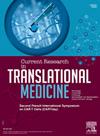Immunotherapy with ex vivo–expanded donor-derived NK cells after haploidentical HSCT in pediatric patients with AML: a phase I pilot study
IF 3
4区 医学
Q2 MEDICINE, RESEARCH & EXPERIMENTAL
引用次数: 0
Abstract
Background
Post-transplant relapse remains a considerable challenge for achieving successful outcomes in pediatric patients with acute myeloid leukemia (AML) receiving haploidentical hematopoietic stem cell transplantation (HSCT). Adoptive immune cell therapy strategies utilizing highly purified donor-derived natural killer (NK) cells have been extensively explored in various transplantation settings, demonstrating promise in preventing disease recurrence, especially in pediatric AML patients.
Methods
Five pediatric and adolescent patients with high-risk AML were included in this pilot study and received haploidentical HSCT. On day 7 post-HSCT, all the patients received a single infusion of interleukin (IL)-2 stimulated ex vivo-expanded haploidentical NK cells (1 × 106/kg CD56+ cells of patient body weight).
Results
All the patients tolerated the administration of NK cells without any adverse events during or after the infusion. Relapse occurred in two patients, both within the first 100 days post-transplantation, while three patients remained alive and disease-free one year post-transplantation.
Conclusion
This pilot study demonstrated that the activation, expansion, and infusion of NK cells from readily available haploidentical donors in pediatric and adolescent patients with high-risk AML after HSCT is safe and feasible.
儿童AML患者单倍体造血干细胞移植后体外扩增供体来源NK细胞的免疫治疗:一项I期试点研究
对于接受单倍同型造血干细胞移植(HSCT)的急性髓系白血病(AML)患儿,移植后复发仍然是一个相当大的挑战。利用高度纯化的供体来源的自然杀伤(NK)细胞的过继免疫细胞治疗策略已经在各种移植环境中进行了广泛的探索,显示出预防疾病复发的希望,特别是在儿科AML患者中。方法5例儿童和青少年高危AML患者接受单倍同型造血干细胞移植。在hsct后第7天,所有患者接受单次输注白细胞介素(IL)-2刺激的体外扩增单倍体NK细胞(1 × 106/kg患者体重CD56+细胞)。结果所有患者在输注NK细胞期间及输注后均能耐受,无不良反应发生。2例患者复发,均在移植后的前100天内,而3例患者在移植后一年内存活且无疾病。本初步研究表明,在儿童和青少年高危AML患者HSCT后,激活、扩增和输注来自单倍体相同供体的NK细胞是安全可行的。
本文章由计算机程序翻译,如有差异,请以英文原文为准。
求助全文
约1分钟内获得全文
求助全文
来源期刊

Current Research in Translational Medicine
Biochemistry, Genetics and Molecular Biology-General Biochemistry,Genetics and Molecular Biology
CiteScore
7.00
自引率
4.90%
发文量
51
审稿时长
45 days
期刊介绍:
Current Research in Translational Medicine is a peer-reviewed journal, publishing worldwide clinical and basic research in the field of hematology, immunology, infectiology, hematopoietic cell transplantation, and cellular and gene therapy. The journal considers for publication English-language editorials, original articles, reviews, and short reports including case-reports. Contributions are intended to draw attention to experimental medicine and translational research. Current Research in Translational Medicine periodically publishes thematic issues and is indexed in all major international databases (2017 Impact Factor is 1.9).
Core areas covered in Current Research in Translational Medicine are:
Hematology,
Immunology,
Infectiology,
Hematopoietic,
Cell Transplantation,
Cellular and Gene Therapy.
 求助内容:
求助内容: 应助结果提醒方式:
应助结果提醒方式:


